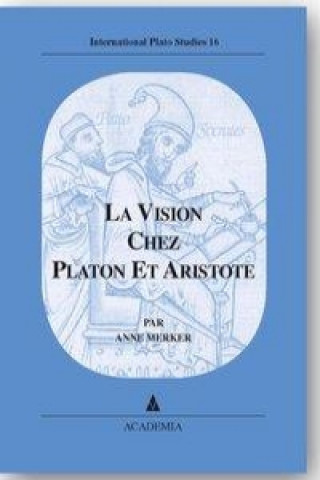
Code: 12763426
La Vision chez Platon et Aristote
by Anne Merker
Ni les considérations aristotéliciennes ni les considérations platoniciennes sur la vision ne se bornent ŕ répondre ŕ la question comment voit-on?, mais dans l'élaboration męme de cette réponse dépassent cette question vers une au ... more
- Language:
 French
French - Binding: Hardback
- Number of pages: 276
Publisher: Academia Verlag GmbH, 2003
- More about this

Availability alert
Enter your e-mail address and once book will be available,
we will send you a message. It's that simple.
More about La Vision chez Platon et Aristote
 Book synopsis
Book synopsis
Ni les considérations aristotéliciennes ni les considérations platoniciennes sur la vision ne se bornent ŕ répondre ŕ la question comment voit-on?, mais dans l'élaboration męme de cette réponse dépassent cette question vers une autre, plus fondamentale: qu'est-ce que voir? La premičre de ces questions relčve d'une enquęte scientifique qui vise ŕ expliquer un phénomčne par la description de son mécanisme. Elle est pleinement prise en compte par Platon et Aristote, qui proposent tous deux un exposé particulier des causes conduisant ŕ la formation de la sensation visuelle. Ces exposés diffčrent nettement dans leur contenu, mais se trouvent en fait relativement ŕ égalité quant ŕ leur pertinence scientifique: ŕ la fois quant ŕ leur capacité de rendre compte du phénomčne qu'ils se proposent d'expliquer, et quant ŕ l'économie des moyens mis en ouvre pour parvenir ŕ cette explication. oe la différence, la question qu'est-ce que voir? déborde la simple intention de rendre compte du fonctionnement d'un phénomčne, et inscrit la vision dans des problématiques qui touchent l'ętre de ce qui voit, l'ętre de ce qui est vu et du monde dans lequel ce processus a lieu; ou qui touchent aussi bien l'ontologie que l'éthique, le fondement de la connaissance que l'esthétique ou męme la théologie. La théorie de Platon révčle sa profondeur quand on saisit que la vision sensible est celle d'une âme divine qui vit sur terre en exil, tandis que les intentions d'Aristote sont prioritairement épistémologiques; sa théorie permet de garantir la vérité du sens visuel, la réalité de la couleur, mais aussi la présence immédiate et authentique de l'astre divin solaire au sein du lieu soumis ŕ la génération et ŕ la corruption. *** Neither Aristotle nor Plato content themselves with answering the question: How do we see?. In their examination of this scientific issue, they go further, and answer the more fundamental question: What is seeing? The first question pertains to scientific enquiry, which seeks to explain a phenomenon by describing its mechanism. Both Aristotle and Plato give an accurate account of the causes that produce visual sensation. Their accounts differ, but are quite similar with regard to their scientific relevance; they have quite the same capacities and the same failures in their explanation of vision, achieved by equally economical means. The other question - What is seeing? - transcends the mere intention of giving an account of a mechanism, and considers vision from the viewpoint of problems concerning the being of the seer, of what is seen, and of the world in which this process takes place; and it touches upon issues concerning ontology as well as ethics, epistemology and aesthetics, and even theology. Plato's theory reveals its depth when we grasp that sensible vision is that of a divine soul that lives on earth as in exile. Through vision, this soul may seek to escape from its condition, and recover its genuine nature; for vision is the only sense by which we can reach the stars, which, for Plato, feature the same harmony as that of the soul when it was first formed by the demiurge. Yet vision can also plunge the soul further down into its exile. Hence, the Platonic conception of mirror images, which he defines as real bodies, resulting from the coalescence between two fires; they actually occur at the surface of the mirror, without there being any reflection in the modern sense of the term. In this way, Plato refuses to endorse the idea that the mirror image is mere indirect vision, or something virtual, thereby saving the image in the proper sense. Thus, through vision, the soul can encounter inferior realities, which drag it further and further way from the things that are genuine and true. Aristotle's concerns are primary epistemological. His theory provides a guarantee of the truth and reliability of the sense of sight, whereas Plato's theory defined the vision of color as pure sensation, without there being any particular reality in the observed body itself. In Aristotle's theory, the act of vision becomes instantaneous, so that the vision of a color is strictly simultaneous with the state of the body in which the color is observed. This instantaneity is the condition by which, in the Aristotelian physical system, the oneness of time itself can be attained. Moreover, Aristotle's concept of light provides the basis for the immediate and authentic presence of the divine solar star in the midst of the place that is subject to generation and to corruption. Yet Aristotle's theory, as set forth in the De anima and the De sensu, so closely related to the problem of truth, was to prove helpless once the philosopher is forced to explain peculiar phenomena (such as the halo, or the rainbow), which Greek optics had already considered to be formed by visual reflection. Aristotle will then temporarily forget his own theory, and adopt precisely the one he had previously condemned.
 Book details
Book details
- Full title: La Vision chez Platon et Aristote
- Author: Anne Merker
- Language:
 French
French - Binding: Hardback
- Number of pages: 276
- EAN: 9783896652737
- ISBN: 3896652737
- ID: 12763426
- Publisher: Academia Verlag GmbH
- Weight: 515 g
- Dimensions: 238 × 165 × 22 mm
- Date of publishing: January 2003
Trending among others
-

Coloriages Mystères Disney Portraits
93.15 zł -

Le Petit Prince
23.31 zł -

Coloriages mystères Disney Princesses
92.35 zł -

Disney Best of Les Grands classiques (Coloriages mystères)
92.45 zł -

Tarot de Marseille
113.35 zł -

Love Stories
90.24 zł -

L'etranger
42.30 zł -9 % -

ABC DELF Junior
89.23 zł -13 % -

ABC DELF Junior
92.45 zł -

Le DELF 100% reussite
109.23 zł -

Bescherelle La conjugaison pour tous
35.97 zł -1 % -

Edito A2 - Edition 2022 - Livre + code numérique + didierfle.app
90.54 zł -

Le guide culinaire d'Escoffier
104.11 zł -9 % -

Changer l'eau des fleurs
57.17 zł -10 % -

DELF B1 Scolaire et Junior 100% reussite - 2ème édition - Livre + didierfle.app
69.84 zł -

Madame Bovary
31.65 zł -

DELF junior / scolaire B1 - Conforme au nouveau format d'épreuves
97.97 zł -

Edito A2 - Edition 2022 - Cahier + didierfle.app
51.54 zł -

Grammaire progressive du francais - Nouvelle edition
133.05 zł -5 % -

Communication progressive du français débutant + CD NC
131.54 zł -4 % -

Coloriages Mystères Disney Mickey, Donald & Co
90.24 zł -

ABC DELF
97.57 zł -5 % -

Coloriages mystères Disney Hiver
90.24 zł -

Le DELF 100% reussite
76.17 zł -

Coloriages mystères Les grands classiques Disney tome 3
90.24 zł -

Inspire 1 : Livre de l'élève + audio/vidéo + Parcours digital (A1)
106.52 zł -

Vocabulaire progressif du français - Avec 675 exerçices - C1 C2 Perfectionnement
152.04 zł -

DELF tout public B2 - Conforme au nouveau format d'épreuves
109.23 zł -

501 French Verbs
74.86 zł -23 % -

Un animal sauvage - Nouveauté Joël Dicker 2024
130.13 zł -10 % -

Grands classiques Tome 10
90.24 zł -

Coloriages Mystères Trompe l'oeil tome 3
90.24 zł -

Annees
51.75 zł -9 % -

Coloriages Mystères Disney - Bestiaire
90.24 zł -

DELF junior/scolaire B1 + audio en téléchargement Nouveau format d'épreuves
103.60 zł -

ABC DELF
90.03 zł -
![FLE (Français langue étrangère). Le français en vrai ! Pour communiquer au quotidien [B1-C1] (avec fichiers audio) FLE (Français langue étrangère). Le français en vrai ! Pour communiquer au quotidien [B1-C1] (avec fichiers audio)](https://media.libris.to/jacket/34249503t.jpg)
FLE (Français langue étrangère). Le français en vrai ! Pour communiquer au quotidien [B1-C1] (avec fichiers audio)
101.19 zł -

Mes flans pâtissiers
127.02 zł -

Coloriages mystères Les Grands classiques Disney Tome 8
90.24 zł -

Mes flans pâtissiers 2
127.02 zł -

50 coloriages mystères
79.58 zł -

Coloriages mystères Disney - Les Grands classiques Tome 11
90.24 zł -

Coloriages mystères Pixar
90.24 zł -

Coloriages mystères Disney Méchants
90.24 zł -

Arsène Lupin, gentleman cambrioleur suivi de Les confidences d'Arsène Lupin
51.75 zł -9 % -

De la nuit lenormand oracle
87.02 zł -

Inspire
43.81 zł -

Coloriages Mystères Looney Tunes
90.24 zł
safisfied customers
Since 2008, we have served long line of book lovers, but each of them was always on the first place.
Copyright! ©2008-24 libristo.pl All rights reservedPrivacyPoučení o cookies



 21 million books
21 million books Delivery 12.99 zł
Delivery 12.99 zł (32) 444 93 66 (8-15.30h)
(32) 444 93 66 (8-15.30h)